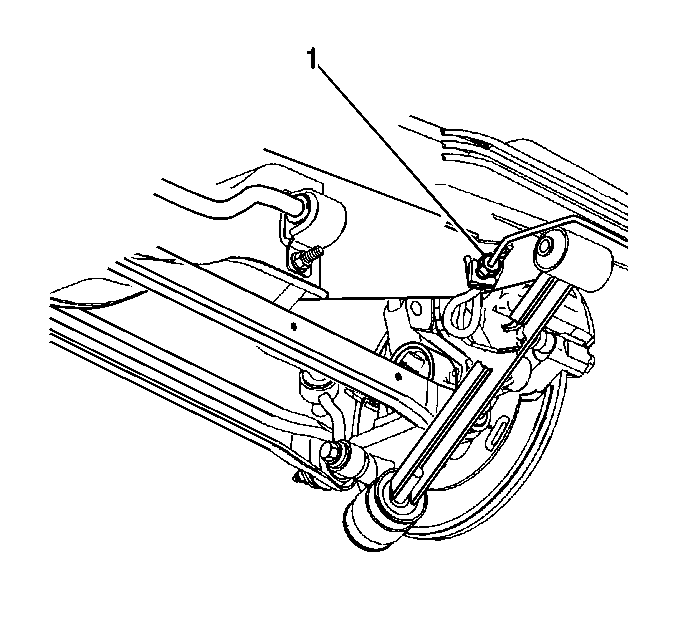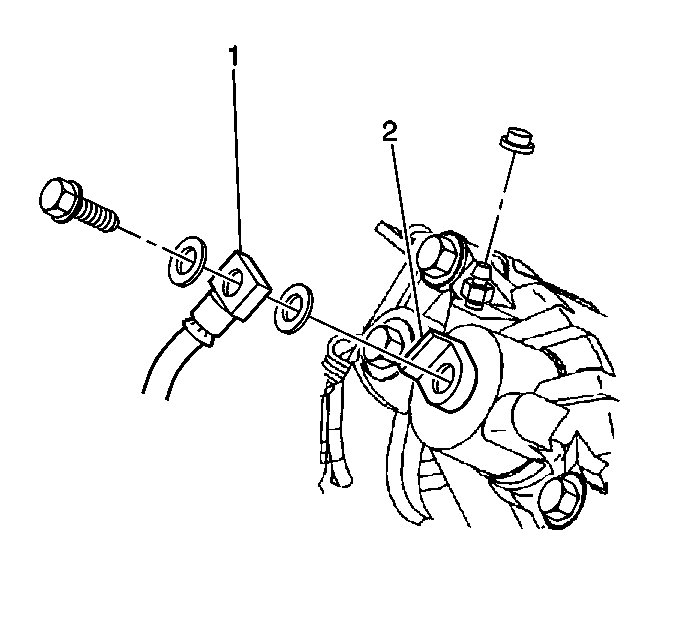Removal Procedure
- Raise and suitably support the vehicle. Refer to Lifting and Jacking the Vehicle in General Information.
- Remove the tire and the wheel. Refer to Tire and Wheel Removal and Installation in Tires and Wheels.
- Clean dirt and foreign material from the brake hoses and fittings.
- Use a backup wrench on the hose fitting (1) in order to remove the brake pipe from the brake hose.
- Remove the following items from the caliper (2) and/or rear wheel cylinder:
Caution: Do not move the vehicle until a firm brake pedal is obtained. Air in the brake system can cause loss of brakes with possible personal injury.
Notice: Do not allow components to hang from the flexible brake hoses as damage to the hoses may occur. Some brake hoses have protective rings or covers to prevent direct contact of the hose with other chassis parts. Besides causing possible structural damage to the hose, excessive tension could cause the hose rings to move out of their proper locations.
Notice: Brake hoses should not be crimped at any point to prevent loss of brake fluid from any component.

Do not bend the brake pipe or the bracket.

| • | The brake hose bolt |
| • | The hose (1) |
| • | The 2 washers |
| • | Discard the 2 washers. |
Installation Procedure
- Install the following items to the caliper (2) and/or wheel cylinder:
- Lubricate the bolt threads with brake fluid.
- With the weight of the vehicle on suspension, install the hose into the bracket.
- Use a backup wrench on the hose fitting in order to connect the brake pipe to the brake hose.
- Do not bend the bracket or the pipe.
- Install the tire and wheel. Refer to Tire and Wheel Removal and Installation in Tires and Wheels.
- Lower the vehicle.
- Bleed the brakes. Refer to Hydraulic Brake System Bleeding in Antilock Brakes.

| • | The brake hose bolt |
| • | The hose (1) |
| • | The 2 new washers |
| • | Use new washers. |
Notice: Use the correct fastener in the correct location. Replacement fasteners must be the correct part number for that application. Fasteners requiring replacement or fasteners requiring the use of thread locking compound or sealant are identified in the service procedure. Do not use paints, lubricants, or corrosion inhibitors on fasteners or fastener joint surfaces unless specified. These coatings affect fastener torque and joint clamping force and may damage the fastener. Use the correct tightening sequence and specifications when installing fasteners in order to avoid damage to parts and systems.
Tighten
Tighten the brake hose caliper bolt to 54 N·m (40 lb ft).
Tighten
Tighten the brake hose wheel cylinder bolt to 50 N·m (37 lb ft).
Ensure that there are no kinks in the hose.
Align the hose fitting with a notch in the bracket. Use the hose paint stripe as a visual aid.

Notice: Use the correct fastener in the correct location. Replacement fasteners must be the correct part number for that application. Fasteners requiring replacement or fasteners requiring the use of thread locking compound or sealant are identified in the service procedure. Do not use paints, lubricants, or corrosion inhibitors on fasteners or fastener joint surfaces unless specified. These coatings affect fastener torque and joint clamping force and may damage the fastener. Use the correct tightening sequence and specifications when installing fasteners in order to avoid damage to parts and systems.
Tighten
Tighten the fittings to 23 N·m (17 lb ft).
